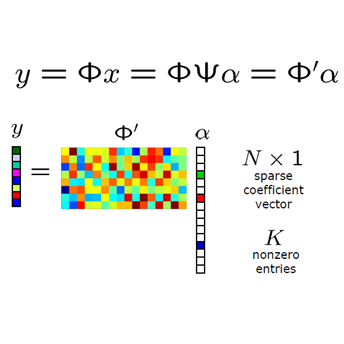In this work, we study the following problem, that we refer to as Low Rank column-wise Compressive Sensing (LRcCS): how to recover an $n \times q$ rank-$r$ matrix, $X^* =[x^*_1 , x^*_2 ,...x^*_q]$ from $m$ independent linear projections of each of its $q$ columns, i.e., from $y_k := A_k x^*_k , k \in [q]$, when $y_k$ is an $m$-length vector. The matrices $A_k$ are known and mutually independent for different $k$. The regime of interest is low-rank, i.e., $r \ll \min(n,q)$, and undersampled measurements, i.e., $m < n$. Even though many LR recovery problems have been extensively studied in the last decade, this particular problem has received little attention so far in terms of methods with provable guarantees. We introduce a novel gradient descent (GD) based solution called altGDmin. We show that, if all entries of all $A_k$s are i.i.d. Gaussian, and if the right singular vectors of $X^*$ satisfy the incoherence assumption, then $\epsilon$-accurate recovery of $X^*$ is possible with $mq > C (n+q) r^2 \log(1/\epsilon)$ total samples and $O( mq nr \log (1/\epsilon))$ time. Compared to existing work, to our best knowledge, this is the fastest solution and, for $\epsilon < 1/\sqrt{r}$, it also has the best sample complexity. Moreover, we show that a simple extension of our approach also solves LR Phase Retrieval (LRPR), which is the magnitude-only generalization of LRcCS. It involves recovering $X^*$ from the magnitudes of entries of $y_k$. We show that altGDmin-LRPR has matching sample complexity and better time complexity when compared with the (best) existing solution for LRPR.
翻译:在这项工作中,我们研究以下问题,我们称之为“低Rich 柱度 ” 的复杂度 : 如何从美元每立方美元的独立线性预测中收回美元=1, x ⁇ 2,...x ⁇ q]美元 美元 。 美元=k:= A_kxk, k = 美元= 美元, 美元= 美元, 美元是 美元 的复杂度 : 美元是 美元, 美元是 美元, 美元是 美元, 美元是 美元, 美元 美元 美元, 美元 美元 美元 美元, 美元 美元 美元 美元, 美元 美元 美元 美元 美元, 美元 美元, 美元 美元 美元, 美元 美元 。 美元 平方 平方 平方 平方平方平方平方平方平方平方平方平方平方平方平方平方平方平方平方平方平方平方平方平方平方平方平方平方平方平方平方平方平方平方平方平方平方平方平方平方平方平方平方平方平方平方平方平方平方平方平方平方平方平方平方平方平方平方平方平方平方平方平方平方平方平方平方平方平方平方平方平方平方平方平方平方平方平方平方平方平方平方平方平, 。
相关内容
- Today (iOS and OS X): widgets for the Today view of Notification Center
- Share (iOS and OS X): post content to web services or share content with others
- Actions (iOS and OS X): app extensions to view or manipulate inside another app
- Photo Editing (iOS): edit a photo or video in Apple's Photos app with extensions from a third-party apps
- Finder Sync (OS X): remote file storage in the Finder with support for Finder content annotation
- Storage Provider (iOS): an interface between files inside an app and other apps on a user's device
- Custom Keyboard (iOS): system-wide alternative keyboards
Source: iOS 8 Extensions: Apple’s Plan for a Powerful App Ecosystem




